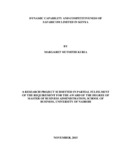| dc.description.abstract | In a fast-moving business environments open to global competition and characterized by
dispersion in the geographical and organizational sources of innovation, firms have
adopted aggressive competitive strategies to achieve congruence with changing
environment in the robust telecommunication industry in Kenya. The study sought to
establish the relationship between dynamic capability and the competitiveness of
Safaricom limited. The study adopted a case study research design and was guided by the
following objectives; to determine the various dynamic capability practices adopted by
Safaricom limited, to determine the various types of competitiveness enjoyed by
Safaricom limited Kenya, and to establish the relationship between dynamic capability
and the competitiveness of Safaricom limited. The study utilized primary data which was
collected through a face to face interview with the researcher. Five people were
interviewed using an interview guide containing a set of questions. The interviewees
included top level managers who are tasked with strategic planning and management at
Safaricom Limited. Qualitative data was obtained from the interview guide and was
analyzed using Content analysis. The study found out that Safaricom Limited has been
applying Dynamic capability management practices in its operations. Safaricom has
embraced the following dynamic capability practices: ability to assimilate and exploit
new technology from the environment; recognition of the value of new information;
Industry-Government-University collaboration; concurrent engineering; R&D department
closeness to other functional areas; internal and external sourcing of technology; Vertical
integration; establishment of inter-group relations and cross-functional teams; corporate
culture orientation towards innovation; and top management support. The study
concludes that Safaricom limited has successfully adopted and implemented diverse
Dynamic capability practices and that, theses dynamic capability practices have
positively affected the competitive advantage of the firm making it a market leader in
Kenya and beyond. Given the fact that dynamic capability practices positively influences
firm competitiveness, the study recommends that other firms within and outside the
telecommunication industry embrace dynamic capability approaches in their operations.
The study further recommends that telecommunication firms and other key stakeholders
should establish strategies to increase awareness and information dissemination on
dynamic capability models across all sectors in Kenya to enhance both firm and national
competitiveness. The study was limited to the extent that the research findings might not
be generalizable and applicable to other telecommunication companies in Kenya owing
to the fact that different telecommunication companies use different operations strategies.
The study suggests further research efforts to focus on identifying optimal dynamic
capability practices and on the possibility of setting benchmarks | en_US |

